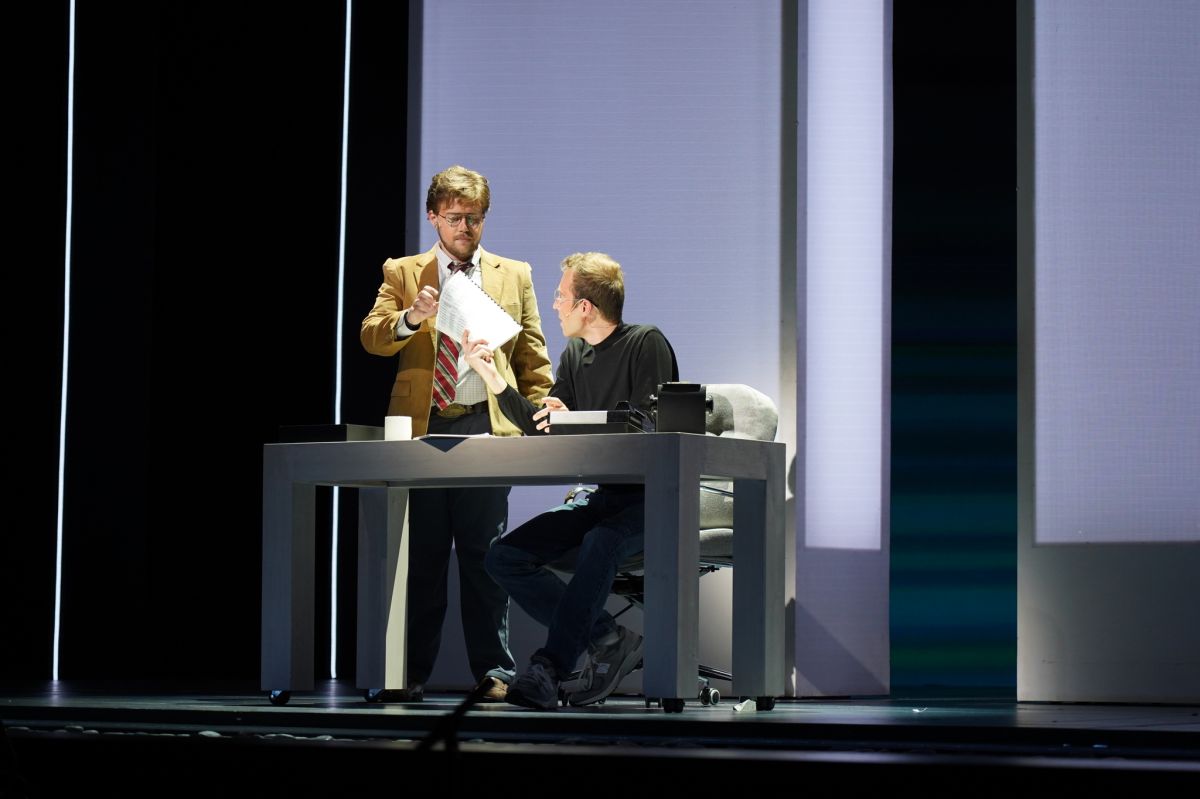
Joseph McBrayer as Steve Wozniak (L) and Jeremy Weiss as Steve Jobs (R). (Photo Credit: IU Jacobs School of Music)
From its opening scene, The (R)evolution of Steve Jobs by Mason Bates is different. It doesn’t begin at a masked ball, or at a party filled with powdered wigs, or a wedding, or a royal banquet. It starts at a product launch for the iPhone. An event that most of us remember hearing about, if not being excited about. It’s the currency of the subject matter that immediately sets this opera apart from most operas performed today.
“I think this piece is the future of opera," says Jeremy Weiss, one of the students at the Jacobs School of Music portraying Steve Jobs this weekend. He, along with Joseph McBrayer, who plays Jobs’ estranged business partner Steve Wozniak, or “Woz,” agree that the an opera about someone whose legacy is carried around in so many people’s backpacks and pockets could be a game-changer for the art form.
“I think a discussion that the whole team has had is that we love this art form – we love opera, and not a lot of it is easily accessible," says McBrayer. "So having something modern to talk about that everybody knows about – everybody knows Steve Jobs in some way or another, and they know Apple products. And they may not know Steve Wozniak or Laurene Powell Jobs, they may not know all these other characters. But they know the idea, and they know that this is someone who is very influential on their everyday lives. So to have that open door they can come into and say ‘well, I don’t know anything about opera, but I know about this,’ it’s a stepping stone towards other things so we can keep doing what we love to do."
Everyone may know who Steve Jobs was, but was his life compelling enough to create a meaningful story? That was the challenge faced by librettist Mark Campbell.
“When you do an opera about a historical figure, and especially one that’s so present that’s so present in everyone’s mind and everyone’s memory, we all think we know Steve Jobs," says Campbell. "He died in 2011 and he’s still very much a part of our lives. It was important to me to take all this research and all these facts and all these events, and kind of lodge them into my brain in a certain place and then put them aside and then create a story that could also be viewed as fiction."
Another challenge was presenting the less savory parts of Steve Jobs’ life while giving the audience the chance to have some empathy for the troubled main character.
“There were aspects of his personality that I didn’t care for – the way he treated his coworkers, the way he treated his biological daughter was really not acceptable. But I found a way to humanize him.”
Humanizing a man with a checkered but highly innovative personality combined with that personality’s immediate recognition by a majority of potential opera consumers was one part of the puzzle. For the opera to truly resonate, though, the music had to be accessible as well. In that respect, Jeremy Weiss thinks it is completely successful.
“I think this piece fuses classical art music with something you might hear in a move score, so like that kind of emotional music with really long lines. Club music. I think the music is super accessible and very heartfelt. I think an audience won’t view this as very esoteric contemporary classical art music that they can’t connect with. It’s really easy to connect with while still maintaining a high level of artistic integrity, too,” says Weiss.
While the bleeps and bloops may seem a tad gimmicky at times, and the dialog among the characters perhaps slightly contrived, ultimately Mason Bates’s “The (R)evolution of Steve Jobs” succeeds. And the success is in no small part thanks to the investment of the cast.
“We definitely are Steve and Woz,” says Jeremy Weiss.
“To the point where he scares me sometimes,” says Joseph McBrayer. “So early on in the process – I didn’t know Jeremy super well before this, but I knew he was a friendly guy. And once we got in this piece and he started BEING Steve Jobs, we would do a scene and he would glare me in the eyes. And especially in one of the scenes where he has to be horrible to me, we’d be done and he’d be like ‘Great job, buddy!’ And I’d be like ‘Don’t talk to me right now,’ because it was just terrifying. But yeah, we figured it out.”
Bloomington audiences still have one more chance to see these two figure it out, and two chances overall, to see “The (R)evolution of Steve Jobs” this weekend. If this production is indeed, as Weiss says, the future of opera, than the future would seem to be in good hands.






